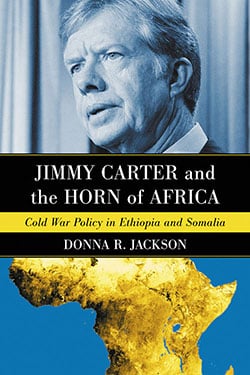Jimmy Carter and the Horn of Africa
Cold War Policy in Ethiopia and Somalia
$29.95
In stock
About the Book
When Jimmy Carter ascended to the U.S. presidency in 1977, he stepped into an office still struggling with the aftermath of the Vietnam War and the Watergate scandal. As president, he had to administer his foreign policy and fight the Cold War within the limits imposed by both. With the option of traditional military recourse essentially closed to Carter, he redirected American foreign policy to challenge the Soviet Union on a moral level, emphasizing regionalism and human rights. A careful examination of his policy shows that his approach was similar in other parts of the world. Particularly representative were his actions in Ethiopia and Somalia.
This analysis of President Carter’s foreign policy in the Horn of Africa demonstrates Carter’s consistent approach to foreign affairs throughout his administration. It follows the president’s deliberate designing of his overall policy and his attempt to regain for the presidency the trust and confidence of the American people. It discusses the ways in which this policy dealt with such issues as human rights abuses, Cold War concerns including a strong Communist bloc presence, and the violation of international law. Finally, the book examines the changes that occurred at the end of Carter’s administration and the corresponding changes in policy—but not in motivation.
About the Author(s)
Bibliographic Details
Donna R. Jackson
Format: softcover (6 x 9)
Pages: 240
Bibliographic Info: notes, bibliography, index
Copyright Date: 2007
pISBN: 978-0-7864-2987-5
eISBN: 978-0-7864-8372-3
Imprint: McFarland
Table of Contents
Acknowledgements vii
Preface 1
Introduction: Does History Matter? 3
I. A New Hope 21
II. Shifting Alliances: The United States, Ethiopia and Somalia 36
III. War in the Ogaden 68
IV. Continuing Dilemmas and Times of Transition 102
V. 1980: Cold War Resurgent 137
Conclusion: History Does Matter 172
Chapter Notes 187
Bibliography 215
Index 223





